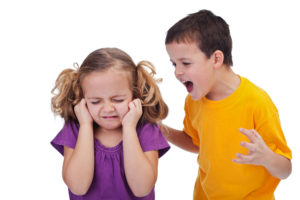
How to Handle the Sibling Bickering or Put-Downs from Peers?
Often our children are reinforcing teasing and taunting without even realizing it. It’s an important life skill to learn to recognize this antagonistic behaviour and to know how to handle it.
Even children as young as 5 years old can learn these important social skills as they gain an understanding of the dynamics of the behaviour.
I love to teach concepts through books, (and I love children’s literature) thus when I discovered the book, Simon’s Hook by Karen Gedig Burnett, I was thrilled.
This book is applicable for all elementary school-age children. For the youngest children, one may need to adapt it a little by simplifying the language, and for older children, I explain that although it’s a younger children’s book, it has a very important metaphor that I’d like to share with them.
Using Fishing as a Metaphor for Social Behaviour and the Reinforcement Cycle
In this book, Grandma Rose explains to Simon, that every time he gets upset or shows a negative reaction in response to the teasing by his peers, he actually encourages them.
It is as if they have put some bait on a fishing line, and he is the fish that has come along and bit!
As soon as he is reeled in, the fisherman feels like a winner (and has a sense of false power) and the fisherman goes back for more!
This cycle continues unless the “fish” chooses some different strategies.
Throughout the book, the fish learn at fish school that ignoring or swimming in another part of the sea leaves the fisherman with no excitement and ultimately boredom.
The fish also learn how to hold onto their power by making a joke, distracting the fisherman, and/or agreeing that their statement could be plausible.
Every situation is different, and many examples are given to show how one may use different strategies at various times.
Once children realize that they have much more power than they think, by choosing to react in an opposite way than what the “fisherman” expect, they learn that there is more power in remaining calm and being wise about how their strategic response.
I recommend reading this book to your children 1:1, to generate a personal discussion which relates to the dynamics, with perhaps a sibling or a peer.
Help them see how they can “hold on to their power”, rather than give it away to the other person, which will only entice the other person to come back for more.
This is one of the lessons that I teach in my Self-Empowerment Course for children. I read the story and then we act it out with pretend fishing rods and hypothetical teasing comments attached as bait. Each child practices using one of the five pro-active strategies for holding onto their power.
Once children realize that it’s actually more powerful to stay calm and strategic, which may involve just ignoring and walking away, versus yelling and fighting, they become more motivated to handle the situation proactively versus reactively.
I hope this metaphor will lead to more peaceful road trips and less sibling rivalry!
Warmly,
P.S. To find out more and to register for the next round of Self-Empowerment groups for children ages 7-9 years and 10-12 years, click here.
Want to Connect?
Subscribe now to receive free weekly parenting tips and inspiration.







